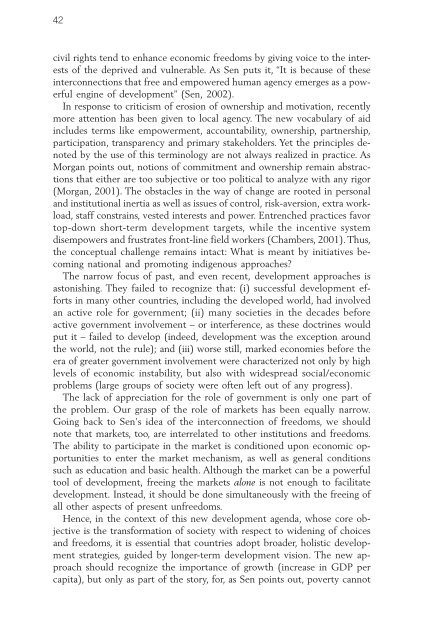Dialogue in Pursuit of Development - Are you looking for one of ...
Dialogue in Pursuit of Development - Are you looking for one of ...
Dialogue in Pursuit of Development - Are you looking for one of ...
Create successful ePaper yourself
Turn your PDF publications into a flip-book with our unique Google optimized e-Paper software.
42<br />
civil rights tend to enhance economic freedoms by giv<strong>in</strong>g voice to the <strong>in</strong>terests<br />
<strong>of</strong> the deprived and vulnerable. As Sen puts it, “It is because <strong>of</strong> these<br />
<strong>in</strong>terconnections that free and empowered human agency emerges as a powerful<br />
eng<strong>in</strong>e <strong>of</strong> development” (Sen, 2002).<br />
In response to criticism <strong>of</strong> erosion <strong>of</strong> ownership and motivation, recently<br />
more attention has been given to local agency. The new vocabulary <strong>of</strong> aid<br />
<strong>in</strong>cludes terms like empowerment, accountability, ownership, partnership,<br />
participation, transparency and primary stakeholders. Yet the pr<strong>in</strong>ciples denoted<br />
by the use <strong>of</strong> this term<strong>in</strong>ology are not always realized <strong>in</strong> practice. As<br />
Morgan po<strong>in</strong>ts out, notions <strong>of</strong> commitment and ownership rema<strong>in</strong> abstractions<br />
that either are too subjective or too political to analyze with any rigor<br />
(Morgan, 2001). The obstacles <strong>in</strong> the way <strong>of</strong> change are rooted <strong>in</strong> personal<br />
and <strong>in</strong>stitutional <strong>in</strong>ertia as well as issues <strong>of</strong> control, risk-aversion, extra workload,<br />
staff constra<strong>in</strong>s, vested <strong>in</strong>terests and power. Entrenched practices favor<br />
top-down short-term development targets, while the <strong>in</strong>centive system<br />
disempowers and frustrates front-l<strong>in</strong>e field workers (Chambers, 2001). Thus,<br />
the conceptual challenge rema<strong>in</strong>s <strong>in</strong>tact: What is meant by <strong>in</strong>itiatives becom<strong>in</strong>g<br />
national and promot<strong>in</strong>g <strong>in</strong>digenous approaches?<br />
The narrow focus <strong>of</strong> past, and even recent, development approaches is<br />
astonish<strong>in</strong>g. They failed to recognize that: (i) successful development ef<strong>for</strong>ts<br />
<strong>in</strong> many other countries, <strong>in</strong>clud<strong>in</strong>g the developed world, had <strong>in</strong>volved<br />
an active role <strong>for</strong> government; (ii) many societies <strong>in</strong> the decades be<strong>for</strong>e<br />
active government <strong>in</strong>volvement – or <strong>in</strong>terference, as these doctr<strong>in</strong>es would<br />
put it – failed to develop (<strong>in</strong>deed, development was the exception around<br />
the world, not the rule); and (iii) worse still, marked economies be<strong>for</strong>e the<br />
era <strong>of</strong> greater government <strong>in</strong>volvement were characterized not only by high<br />
levels <strong>of</strong> economic <strong>in</strong>stability, but also with widespread social/economic<br />
problems (large groups <strong>of</strong> society were <strong>of</strong>ten left out <strong>of</strong> any progress).<br />
The lack <strong>of</strong> appreciation <strong>for</strong> the role <strong>of</strong> government is only <strong>one</strong> part <strong>of</strong><br />
the problem. Our grasp <strong>of</strong> the role <strong>of</strong> markets has been equally narrow.<br />
Go<strong>in</strong>g back to Sen’s idea <strong>of</strong> the <strong>in</strong>terconnection <strong>of</strong> freedoms, we should<br />
note that markets, too, are <strong>in</strong>terrelated to other <strong>in</strong>stitutions and freedoms.<br />
The ability to participate <strong>in</strong> the market is conditi<strong>one</strong>d upon economic opportunities<br />
to enter the market mechanism, as well as general conditions<br />
such as education and basic health. Although the market can be a powerful<br />
tool <strong>of</strong> development, free<strong>in</strong>g the markets al<strong>one</strong> is not enough to facilitate<br />
development. Instead, it should be d<strong>one</strong> simultaneously with the free<strong>in</strong>g <strong>of</strong><br />
all other aspects <strong>of</strong> present unfreedoms.<br />
Hence, <strong>in</strong> the context <strong>of</strong> this new development agenda, whose core objective<br />
is the trans<strong>for</strong>mation <strong>of</strong> society with respect to widen<strong>in</strong>g <strong>of</strong> choices<br />
and freedoms, it is essential that countries adopt broader, holistic development<br />
strategies, guided by longer-term development vision. The new approach<br />
should recognize the importance <strong>of</strong> growth (<strong>in</strong>crease <strong>in</strong> GDP per<br />
capita), but only as part <strong>of</strong> the story, <strong>for</strong>, as Sen po<strong>in</strong>ts out, poverty cannot

















![CynefinFramework final [Read-Only]](https://img.yumpu.com/19017304/1/190x135/cynefinframework-final-read-only.jpg?quality=85)